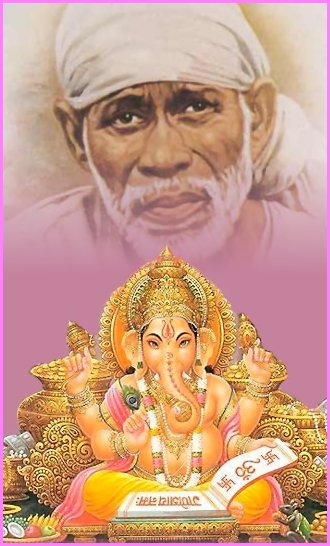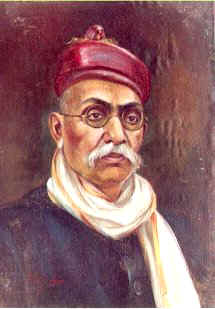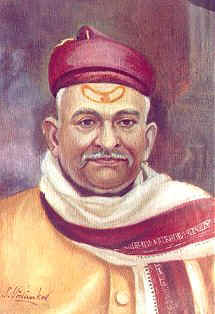 SABURI
SABURI
 SABURI
SABURI
(Victory to Mother Durga (Kali)! Oh Mother, the Ocean of compassion, Oh Mother Kali, Who is adorned with the garland of human skulls (a symbol of Her annihilation of our egoism), Oh Mother, You uplift the world Victory to the Divine Mother who is the Mother of the Universe )Durgey Durgey Durgey Jai Jai Maa Karuna Saagari Maa Kaali Kapaalini Maa Jagadoddharini Maa Jagadambey Jai Jai Maa (repeat)

|
SHRI SAI SATHCHARITHA
|

|
Annadabholkar(Hemadpanth) |
Chapter XXIII |
Dixit |
Cholera Epidemic
Once, Cholera was raging virulently in Shirdi. The residents were much frightened and they stopped all communication with the outside people. The panchas of the village assembled together and decided upon two ordinances as a remedy to check and put down the Epidemic. They were (1) No fuel-cart should be allowed to come in the village, and (2) No goat should be killed there. If anybody disobeyed these ordinances, they were to be fined by the village-authorities and panchas. Baba knew that all this was mere supersition, and therefore, He cared two pence for the Cholera-ordinances. While the ordinances were in force, a fuel-cart came there, and wanted to enter the village. Everybody knew that there was dearth of fuel in the village, still the people began to drive away the fuel-cart. Baba came to know of this. He came to the spot and asked the cartman to take the fuel-cart to the Masjid. None dared to raise his voice against this action of Baba. He wanted fuel for His Dhuni and so He purchased it. Like an Agnihotri keeping his sacred fire alive throughout his life, Baba kept His Dhuni ever burning all day and night; and for this He always stocked fuel. Baba's home, i.e. the Masjid was free and open to all. It had no lock and key; and some poor people removed some wood from there for their use. Baba did not grumble about this. Baba saw that the whole universe was pervaded by the Almighty, and so He never bore enmity or ill-will to anybody. Though perfectly detached. He behaved like an ordinary house-holder to set an example to the people.
Ordeal of Guru-Bhakti
Let us now see, how the second Cholera-ordinance fared with Baba. While it was in force, somebody brought a goat to the Masjid. It was weak, old and about to die. At this time Fakir Pir Mohamad of Malegaon alias Bade Baba was near. Sai Baba asked him to behead it with one stroke, and offer it as an oblation. This Bade Baba was much respected by Sai Baba. He always sat on the right hand of Sai Baba. After the chilim (pipe) was first smoked by him, it was then offered to Baba and others. After the dishes were served, at the time of taking meals at noon, Baba respectfully called Bade Baba and made him sit on His left side, and then all partook of food. Baba paid him also daily Rs.50/- out of the amount collected as Dakshina. Baba accompanied him hundred paces whenever he was going away. Such was his position with Baba. But when Baba asked him to behead the goat, he flatly refused, saying "Why it should be killed for nothing?" Then Baba asked Shama to kill it. He went to Radha-Krishna-Mai and brought a knife from her and placed it before Baba. Knowing the purpose for which the knife was taken, she recalled it. Then Shama went to bring another knife, but stayed in the Wada, and did not return soon. Then came the turn of Kakasaheb Dixit. He was 'good gold' no doubt, but had to be tested. Baba asked him to get a knife and kill the goat. He went to Sathe's Wada and returned with a knife. He was ready to kill it at Baba's bidding. He was born in a pure Brahmin family and never in his life knew killing. Though quite averse to do any act of violence, he made himself bold to kill the goat. All the people wondered to see that Bade Baba, a Mahomedan was unwilling to kill it while this pure Brahmin was making preparations to do so. He tightened his dhotar and with a semicircular motion raised his hand with the knife and looked at Baba for the final signal. Baba said - "What are you thinking of? Go on, strike". Then, when the hand was just about to come down, Baba said - "Stop, how cruel you are! Being a Brahmin, you are killing a goat?" Kakasaheb obeyed and kept the knife down and said to baba - "Your nectarlike word is law unto us, we do not know any other ordinance. We remember You always, meditate on Your Form and obey You day and night, we do not know or consider whether it is right or wrong to kill, we do not want to reason or discuss things, but implicit and prompt compliance with Guru's orders, is our duty and dharma".
Then Baba said to Kakaseheb, that He would Himself do the offering and killing business. It was settled that the goat should be disposed of near a place called Takkya, where fakirs used to sit. When the goat was being removed to that place, it fell dead on the way.
Hemadpant closes the Chapter with a classification of disciples. He says that they are of three kinds : (1) First or best (2) Second or middling and (3) Third or ordinary. The best kind of disciples are those who guess what their Gurus want and immediately carry it out and serve them without waiting for an order from them. The average disciples are those who carry out the orders of their Masters to a letter, without any delay, and the third kind of disciples are those, who go on postponing the carrying out of their orders and making mistakes at every step.
The disciples should have firm faith, backed up by intelligence and if they and patience to these, their spiritual goal will not be distant. Control of breath -- ingoing and outgoing, or Hath-Yoga or other difficult practices are not at all necessary. When the disciples get the above-mentioned qualities, they become ready for further instructions and the Masters then appear and lead them on, in their spiritual path to perfection.
In the next Chapter we will deal with Baba's interesting wit and humour.
Devotees Experiences
BAYAJABAI -THE PERSONIFICATION OF LOVE
While this may seem a very inconsequential leela of Baba, a careful examination will reveal a great deal about the underlying principles of Baba's teachings. Baba said once, "My deeds are unfathomable." We should try to understand the unfathomable deeds of Baba in the light of his teachings. This attempt on our part is also a part of our endeavour along the path. But to try to seek justification for the deeds of Sri Sai Baba in astrology or the science of Vaastu is foolish.
Bayajabai and her group were all packed and ready to go to Pandaripur. Baba called her and asked her to postpone the trip. She did that without a second thought. This shows her infinite trust and devotion for Baba. This is the type of total surrender to his will that Baba has tried to teach us through his sayings, deeds and leelas. That is what we have to inculcate in ourselves and achieve as devotees of Sri Sai Baba. Shama wanted to see why Baba had suddenly cancelled the trip of Bayajabai. So he searched the calendar and thought he found the explanation, that it was an inauspicious day for travel.
There is a danger that some devotees may take Shama's words as an indication that Baba approved the use of astrological tables, calendars and charts. They may feel that Baba encouraged the devotees to see good days for travel and other such traditional superstitions. A little thought will reveal that this feeling is baseless. If the reason why Baba asked Bayajabai to postpone the trip was that the day was inauspicious, why would Baba give them udi and his blessings for departure a bare half hour previously? Would Baba not know that it is not an auspicious day for travel before he gave them the udi? Perhaps Baba had foreknowledge that his action would be misinterpreted to mean that astrology and such stupid superstitions had his imprimatur. That is why he had forbidden Bayajabai, "Do not consult anyone in this matter." This means that Baba, indirectly, and in his inimitable style, had indicated his disapproval of the consultation of astrological calendars and charts and the following of the other superstitious practices.
To think as Tatya did, that Baba had told them to postpone the trip due to his foreknowledge of the cholera epidemic striking Pandaripur, does not fit the facts. If this were the reason, Baba, as he did on many occasions with many devotees, would have told them to cancel the trip altogether. Also, if this were indeed the reason, why had Baba not placed any obstacles to the departure of Radhakrishna Ayi's party which left for Pandaripur earlier, as he did to Bayajabai's group? So why did Baba do this leela? Only Baba knows the meaning of his leelas. As the arati says, "Agaadha tavaa karani" (your acts are unfathomable); Baba's acts are beyond the grasp of mere mortals.
Bayajabai occupies a prominent place amongst the devotees of Sri Sai Baba, in the history of Baba. After serving Baba with sisterly love, Bayajabai breathed her last in 1914. Her husband, Ganapati Kote, had also died a few years earlier. It is natural for the devotees of Baba to be eager to visit the house of Bayajabai where Baba had begged food for sixty years. Bayajabai's family was staying first in a street east of the Chavadi near the present location of Ichhiraj Hotel. They later sold that house and built a new one behind the (present) Pilgrims Hotel near the Mahalakshmi Temple. Now that house has been converted to a hotel and is called the Bayajabai Guest House. Baba would beg for food in both these houses.